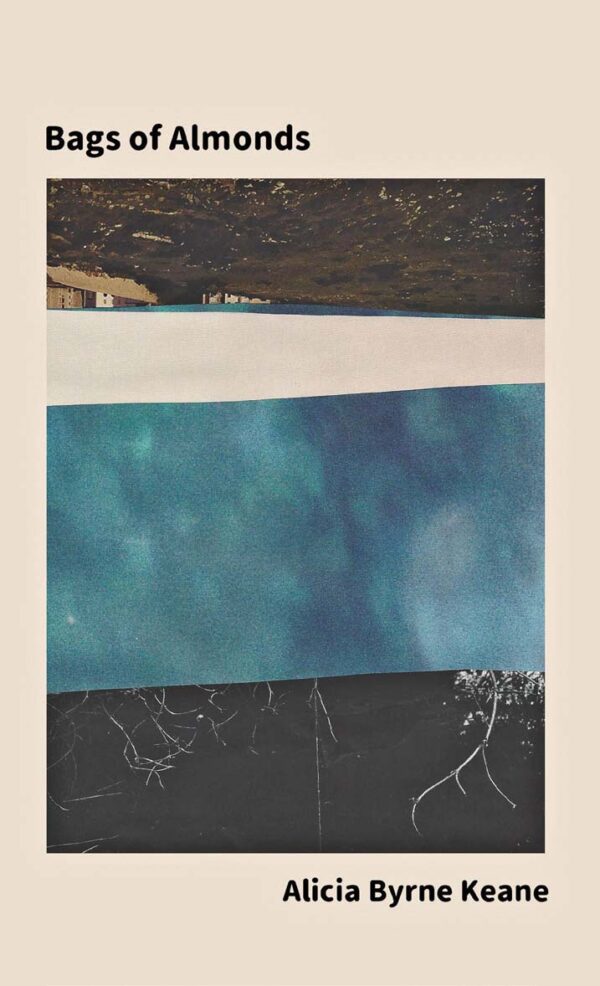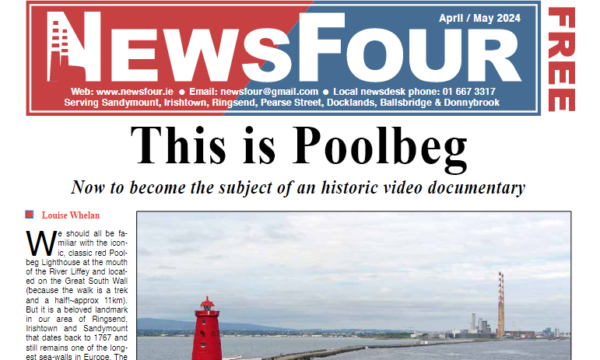
Geneva Pattison
Amidst this global pandemic, the surreal state of lockdown presented a myriad of challenges for people across Ireland. Feelings of anxiety, loss, worry and longing seem to be a universal experience in relation to this new era of covid-19.
Bags of Almonds, written by Dublin poet Alicia Byrne Keane and edited by Aifric Kyne, is a forthcoming poetry collection that was created during lockdown. The collection reflects upon the nature of being during this chaotic and lonely period of time we’re all living through, as experienced and expressed from the poet’s own perspective.
The resounding themes of the collection focus on that of memory, the construct of time, disruption and isolation, as illustrated through lush descriptions of the poet’s current, past and imagined future surroundings.
Keane’s opening poem, Shoulder, presents the idea of discomfort and a sense of frustration. The poet repositions “light on dim glass”, trying to find a modicum of physical peace for themself, in what appears to be a less than adequate situation.
A feeling of disconnectedness is introduced when the poet reflects on the kind parting message in a yoga video. She understands that these videos are “instructed in a faraway voice”, a distant nicety for wound up viewers. However, the words, “take break, take a load off, I don’t know what you’ve got going on in your life”, seem to stop time itself, tearing it apart to conjure a memory. Once again, the poet finds themself in a time when “the week seemed something to be exhaustingly remade”.
This glimpse into the near distant pre-pandemic past, illustrates how important routine and ritual can be to a person in shaping their ideation of self and finding solace. We are pulled back from this vision of the past by the poet, as they “put on suncream in the garden”. This physical act reminds them of the present and the “temporary freshness reconnects” their mind and body to the current moment in time. Keane’s delicate yet powerful depiction of feeling out of one’s body and the fragility of one’s own state of calm, encapsulates the feeling of current times beautifully.
After Maths is another poem by Keane that deals with the question of time and our perception of it. The poet plays tricks on the reader, asking for our full attention, as we try to connect the narrative of the poem. The poem takes us to a playing pitch that looks “like a poured thing, holds a gold fuzz, seems pixelated”. The speaker “points themselves to where the ground flattens” and tries to forget that their neck is a “thin stem holding worries”. The focus shifts as the speaker’s mind jumps to talking about a website about the depth of the ocean’s various levels.
“It tells you about jewel squids, about red being the last colour to leech from the spectrum before things gel in
A uniform shadow.”
The first stanza runs into the second stanza, as we’re presented with a linked thought. “They are going to get CGI crowds for films now”. The “uniform shadow”, grey and soulless, where all colour, all life leeches out. We learn that the poet is already burdened by their thoughts when watching certain films, “whenever I watch a film I just imagine them having to do every scene over and over”. Film and the Arts are generally made for audiences to enjoy the final product. Here, the poet is acknowledging and empathising with the work behind the scenes in the craft, could an absentee crowd fully appreciate this work? This point also begs the question; Will the Arts survive this pandemic?
In the third stanza, the poet reflects on their own struggles with maintaining cohesion in life, “I myself lack continuity”. Time continues to flow forward, yet life doesn’t, “dayslip and hourslip and the slow ebb of light when you forget to be a person in public”. Keane relates a strange state of limbo, where elements of the self are firmly ingrained in the past, the present seems to slip by and the future remains an anxious mystery.
The poet seems to find some sense of solace in the final stanza, as though all thoughts in time seem to connect, they are “preserved in a dim vacuum and right on time”. This remarkable final line is a strong reminder to readers that confusion often ends where acceptance begins. Keane’s words stay with you, as you remember the world continues to turn.
Bags of Almonds is a collection of poetry for our current times. Relatable, with a shared universality to it, while presenting a totally surreal landscape and timeline that prompts you to traverse that of the seemingly unknown. Keane’s questioning of her own place in time asks one to reevaluate their own standing, security and hope. Ultimately, with most of the poems in this collection, there is light at the end of the tunnel, much the same with this current trying period of all our lives.
Bags of Almonds will be released late August 2020 and will be available in selected bookshops.
You can also contact Alicia through her Twitter handle @keane_byrne to enquire about getting a copy of the book.
Interview with Poet Alica Byrne Keane
NF: Your poetry collection was written during lockdown, what specific elements of being in lockdown shaped your poetic voice in the collection?
ABK: The elements that inspired me will probably sound very cliche – I guess, like a lot of people, I became much more interested than usual in spending time in nature since it was one of the activities less affected by lockdown. I also became obsessed with the idea of an immeasurable quantity of time ahead – I began to think of ‘the wait’ – whether that is the wait to see loved ones again, the wait for lockdown to lift fully, the wait for a cure or a vaccine – as a sort of personified entity. I think many of my poems became about describing the wait itself, picturing, personifying it.
NF: The concept and exploration of time is a large thematic component throughout your works, often paired with a sense of anxiety. Is this reflection in any way informed by aspects of our modern, driven society pre-Covid?
ABK: This is a really interesting interpretation, thank you for putting it into words! I think I was writing about the change of pace to life in lockdown specifically, so I really like the fact that the poems maybe unintentionally highlight our need to be busy, or the way we feel a toxic pressure surrounding ‘productivity’ in a negative sense the rest of the time too.
NF: I suppose it takes great states of flux to make us ‘create’ or ‘curate’ time for reflection.
ABK: Exactly!
NF: With regards to the poem “Hill”, you treat a lot of man-made structures more so as organic elements, and the natural elements as something created by man. Does this juxtaposition represent harmony in the urban landscape and a longing to be at the centre of that harmony? A centrality that lockdown has prevented?
ABK: That’s a really interesting question, because I feel in other poems I’ve been writing recently that I am often very negative about the Dublin cityscape. Before lockdown, I lived in an area of the city near Grand Canal Dock where everything seemed very impersonal and corporate and I remember finding that environment very bleak. I know that I was thinking a lot about ecocritical theories of how humans can’t seem to avoid thinking of nature in anthropocentric terms. So I think some of that mixing up of natural and human-made structures in poems like “Hill” is a comment on that.
I was also definitely thinking of certain areas of the city in sort of surreal or idealised terms though, because I hadn’t seen them in months they sort of took on a dreamlike quality. I think that’s maybe where I’m going with descriptions of buildings that look like water and such. There’s definitely a sense of reinventing the mundane city landscape as a more surreal landscape, almost ethereal or otherworldly. Something like a place of worship.
NF: Finally, poems like “Channelling” and “Memory” touch on how stillness, or trying to meditate to clear the mind can sometimes have an opposite effect, causing the mind to flood with unwelcome or unhelpful thoughts. Is the peaceful mind an enemy of the creative mind?
ABK: I think your final sentence there is possibly the sort of paradox that the whole collection hinges on, or that I was trying to explore! I wanted to look at the idea of trying to make a suspended state like lockdown peaceful, but also the potential for that stasis to be full of feelings of threat or grief. Like, a character succeeding in escaping the fear sometimes, through nature or through meditation, but the sense of a fraught situation underlying everything.
I’m still not sure what feeling wins out, or which one I ended up capturing more, but I think it’s really accurate of you to word things in terms of a peaceful mind and sort of overthinking.



